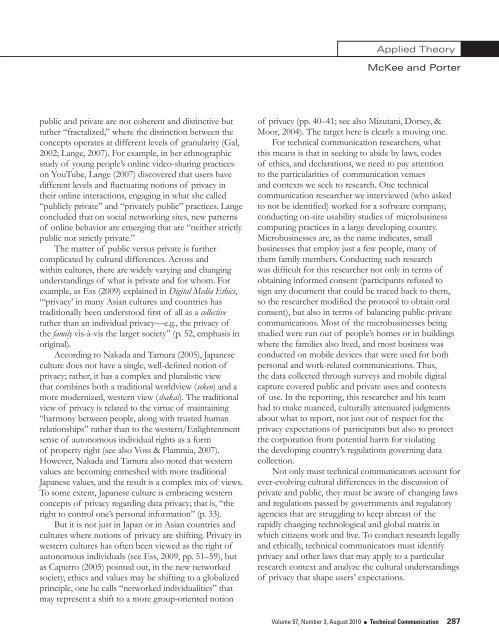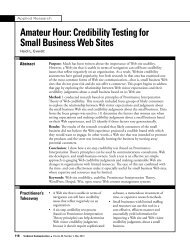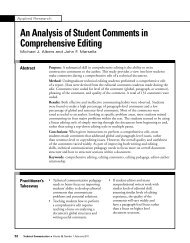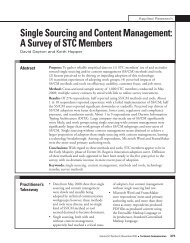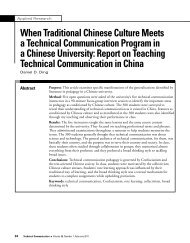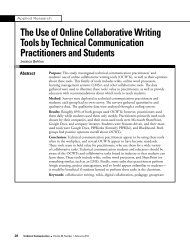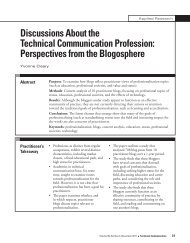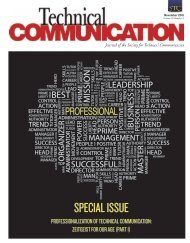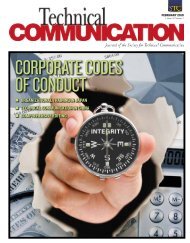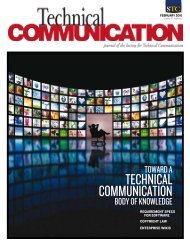Applied TheoryConducting Global Internet Researchmay rely on. Rather, judges may only rule on or dowhat is in the specific wording of laws drafted andpassed by the legislature. For this reason, the pace ofinternational change in relation to such issues—and theprospects for quick harmonization of international legalopinion on these issues—can vary greatly from nationto nation, depending on the legal system at work. (Forfurther discussion and databases of resources on issuesof transnational law and privacy, see UNIDROIT: TheInternational Institute for the Unification of PrivateLaw, http://www.unidroit.org.)In addition to laws, international and nationalcharters, declarations, and statements of principlesfor the rights of persons also apply to technicalcommunication researchers, including the AfricanCharter on Human and Peoples’ Rights (AfricanCommission, 1981), the Charter of FundamentalRights of the European Union (European Parliament,2001), and the most translated document in the world(translated into more than 350 languages): the UniversalDeclaration of Human Rights (United Nations GeneralAssembly, 1948). In this document, a key principle isthat all persons are created equal and are entitled tofull and equal protections, including the protections ofprivacy. Article 12 of the declaration states:No one shall be subjected to arbitraryinterference with his privacy, family, homeor correspondence, nor to attacks uponhis honour and reputation. Everyonehas the right to the protection of the lawagainst such interference or attacks.Depending on how individuals perceive theirInternet communications, technical communicationresearchers—especially those who collect, copy, orquote others’ communications without consent—couldbe perceived as violating an individual’s human right toprivacy.Two tenets of the Code of Ethics of theAssociation of Teachers of Technical Writing (ATTW,2009) regarding our responsibilities to the publicspecifically address issues of privacy:• To protect the security, confidentiality, and privacyof the information we are entrusted with.• To adhere to standard principles of research withhuman subjects by obtaining informed consentand maintaining the privacy and confidentiality ofresearch results.But determining what communications are publicand thus subject to research without informed consent(although copyright considerations may apply—seebelow) is difficult, especially on the Internet. Onthe Internet, the notion of “public” is radicallyproblematized; in most cases there is no bright linedistinguishing between public and private discourse (seeRife, 2007). The Internet consists of a broad continuumof discourse types, ranging from those intended forwide public distribution (e.g., CNN, Médecins SansFrontières, Facebook’s Terms of Use) to those intendedfor limited circulation (e.g., MySpace pages with sharesettings) to those intended for very limited, more privateuse (e.g., communications on corporate intranets).Different forums operate by distinctive customsand particular conditions of use shaped by users’expectations of privacy. Even within a single forum,differing participant norms and expectations may exist,as in Second Life, for example, or on Facebook, wherepeople have different use expectations for profiles andwall posts than for person-to-person messages sent viaFacebook’s e-mail feature. What we see is an emergentconsensus among researchers that the public-privatedistinction should not be regarded so much as a binarywith two unambiguously clear meanings at either endbut rather as a continuum (Bruckman, 2002a; 2002b) oras “indexical signs that are always relative: dependentfor part of their referential meaning on the interactionalcontext in which they are used” (Gal, 2002, p. 80).We can regard the public-private distinction asfractal because “the distinction between public andprivate can be reproduced repeatedly by projecting itonto narrower contexts or broader ones” (Gal, 2002,p. 81). Gal cited as one example the “privacy” of thehouse: Within the public space of a city or street, ahouse is private. But within the house, there are “publicspaces” (the living room) and “private spaces” (thebedroom and bathroom), and within those spacesthe conventions for disclosing information can varydepending on the people who are interacting and theirdegree of trust with one another. Thus, notions of286 Technical Communication l Volume 57, Number 3, August 2010
Applied TheoryMcKee and Porterpublic and private are not coherent and distinctive butrather “fractalized,” where the distinction between theconcepts operates at different levels of granularity (Gal,2002; Lange, 2007). For example, in her ethnographicstudy of young people’s online video-sharing practiceson YouTube, Lange (2007) discovered that users havedifferent levels and fluctuating notions of privacy intheir online interactions, engaging in what she called“publicly private” and “privately public” practices. Langeconcluded that on social networking sites, new patternsof online behavior are emerging that are “neither strictlypublic nor strictly private.”The matter of public versus private is furthercomplicated by cultural differences. Across andwithin cultures, there are widely varying and changingunderstandings of what is private and for whom. Forexample, as Ess (2009) explained in Digital Media Ethics,“‘privacy’ in many Asian cultures and countries hastraditionally been understood first of all as a collectiverather than an individual privacy—e.g., the privacy ofthe family vis-à-vis the larger society” (p. 52, emphasis inoriginal).According to Nakada and Tamura (2005), Japaneseculture does not have a single, well-defined notion ofprivacy; rather, it has a complex and pluralistic viewthat combines both a traditional worldview (seken) and amore modernized, western view (shakai). The traditionalview of privacy is related to the virtue of maintaining“harmony between people, along with trusted humanrelationships” rather than to the western/Enlightenmentsense of autonomous individual rights as a formof property right (see also Voss & Flammia, 2007).However, Nakada and Tamura also noted that westernvalues are becoming enmeshed with more traditionalJapanese values, and the result is a complex mix of views.To some extent, Japanese culture is embracing westernconcepts of privacy regarding data privacy; that is, “theright to control one’s personal information” (p. 33).But it is not just in Japan or in Asian countries andcultures where notions of privacy are shifting. Privacy inwestern cultures has often been viewed as the right ofautonomous individuals (see Ess, 2009, pp. 51–59), butas Capurro (2005) pointed out, in the new networkedsociety, ethics and values may be shifting to a globalizedprinciple, one he calls “networked individualities” thatmay represent a shift to a more group-oriented notionof privacy (pp. 40–41; see also Mizutani, Dorsey, &Moor, 2004). The target here is clearly a moving one.For technical communication researchers, whatthis means is that in seeking to abide by laws, codesof ethics, and declarations, we need to pay attentionto the particularities of communication venuesand contexts we seek to research. One technicalcommunication researcher we interviewed (who askedto not be identified) worked for a software company,conducting on-site usability studies of microbusinesscomputing practices in a large developing country.Microbusinesses are, as the name indicates, smallbusinesses that employ just a few people, many ofthem family members. Conducting such researchwas difficult for this researcher not only in terms ofobtaining informed consent (participants refused tosign any document that could be traced back to them,so the researcher modified the protocol to obtain oralconsent), but also in terms of balancing public-privatecommunications. Most of the microbusinesses beingstudied were run out of people’s homes or in buildingswhere the families also lived, and most business wasconducted on mobile devices that were used for bothpersonal and work-related communications. Thus,the data collected through surveys and mobile digitalcapture covered public and private uses and contextsof use. In the reporting, this researcher and his teamhad to make nuanced, culturally attenuated judgmentsabout what to report, not just out of respect for theprivacy expectations of participants but also to protectthe corporation from potential harm for violatingthe developing country’s regulations governing datacollection.Not only must technical communicators account forever-evolving cultural differences in the discussion ofprivate and public, they must be aware of changing lawsand regulations passed by governments and regulatoryagencies that are struggling to keep abreast of therapidly changing technological and global matrix inwhich citizens work and live. To conduct research legallyand ethically, technical communicators must identifyprivacy and other laws that may apply to a particularresearch context and analyze the cultural understandingsof privacy that shape users’ expectations.Volume 57, Number 3, August 2010 l Technical Communication 287
- Page 1 and 2: AUGUST 2010Volume 57 Number 3SPECIA
- Page 3 and 4: PresidentMichael A. HughesVice Pres
- Page 5 and 6: VoLuME 57, NuMBER 3AUGUST 2010ISSN
- Page 7 and 8: Guest EditorialKirk St.Amant and Ma
- Page 9 and 10: Applied ResearchTechnical Communica
- Page 11 and 12: Applied ResearchNicole St. Germaine
- Page 13 and 14: Applied ResearchNicole St. Germaine
- Page 15 and 16: Applied ResearchNicole St. Germaine
- Page 17 and 18: Applied ResearchNicole St. Germaine
- Page 19 and 20: Applied ResearchNicole St. Germaine
- Page 21 and 22: Applied ResearchNicole St. Germaine
- Page 23 and 24: Applied ResearchNicole St. Germaine
- Page 25 and 26: Applied TheoryTatiana BatovaIntrodu
- Page 27 and 28: Applied TheoryTatiana BatovaMoreno,
- Page 29 and 30: Applied TheoryTatiana BatovaThe Uni
- Page 31 and 32: Applied TheoryTatiana Batovadoctors
- Page 33 and 34: Applied TheoryTatiana BatovaTo addr
- Page 35 and 36: Applied TheoryTatiana Batovathe loc
- Page 37 and 38: Applied TheoryTatiana BatovaJohnson
- Page 39 and 40: Applied TheoryTatiana BatovaInterna
- Page 41 and 42: Applied TheoryMcKee and PorterIntro
- Page 43: Applied TheoryMcKee and PorterFor e
- Page 47 and 48: Applied TheoryMcKee and PorterBecau
- Page 49 and 50: Applied TheoryMcKee and Porterof th
- Page 51 and 52: Applied TheoryMcKee and Porterwith
- Page 53 and 54: Applied TheoryMcKee and PorterA Cop
- Page 55 and 56: Applied TheoryMcKee and PorterConte
- Page 57 and 58: Applied TheoryMcKee and PorterWalto
- Page 59 and 60: Applied ResearchLiza PottsIntroduct
- Page 61 and 62: Applied ResearchLiza Pottsdoes not
- Page 63 and 64: Applied ResearchLiza PottsUser’s
- Page 65 and 66: Applied ResearchLiza Pottsactors, t
- Page 67 and 68: Applied ResearchLiza PottsDRM has a
- Page 69 and 70: Applied ResearchLiza Pottsmake bett
- Page 71 and 72: Applied ResearchLiza PottsOne viewe
- Page 73 and 74: Applied ResearchLiza Pottsinvolved
- Page 75 and 76: Applied ResearchLiza PottsHayhoe, G
- Page 77 and 78: Applied ResearchInternational Fair
- Page 79 and 80: Applied ResearchTyAnna K. Herringto
- Page 81 and 82: Applied ResearchTyAnna K. Herringto
- Page 83 and 84: Applied ResearchTyAnna K. Herringto
- Page 85 and 86: Applied ResearchTyAnna K. Herringto
- Page 87 and 88: Applied ResearchTyAnna K. Herringto
- Page 89 and 90: Book ReviewsWriting Successful Scie
- Page 91 and 92: Book ReviewsThe Process: Business P
- Page 93 and 94: Book ReviewsHCI Beyond the GUI: Des
- Page 95 and 96:
Book ReviewsOrigins of the Specious
- Page 97 and 98:
Book Reviewsgenre, and process, top
- Page 99 and 100:
Book ReviewsPart One goes from the
- Page 101 and 102:
Book Reviewsrather than writers, an
- Page 103 and 104:
Book ReviewsHow to Write Fast Under
- Page 105 and 106:
Book Reviewsmanagement system (CMS)
- Page 107 and 108:
Book Reviewsnearly strangled when h
- Page 109 and 110:
Book Reviewsinteractive TV model)
- Page 111 and 112:
Book ReviewsOtherwise, Beech shows
- Page 113 and 114:
Book Reviewssuch as blog, I found m
- Page 115 and 116:
Book Reviewsemployees and effective
- Page 117 and 118:
Recent & RelevantSherry Southard, E
- Page 119 and 120:
Recent & RelevantRecent & RelevantC
- Page 121 and 122:
Recent & RelevantRecent & RelevantE
- Page 123 and 124:
Recent & Relevantworking in a langu
- Page 125 and 126:
Recent & RelevantWhat’s the big d
- Page 127 and 128:
Recent & RelevantScientific Writing
- Page 129 and 130:
Recent & Relevantapplicability. Man
- Page 131:
Did You Missthe Summit?Don’t miss


